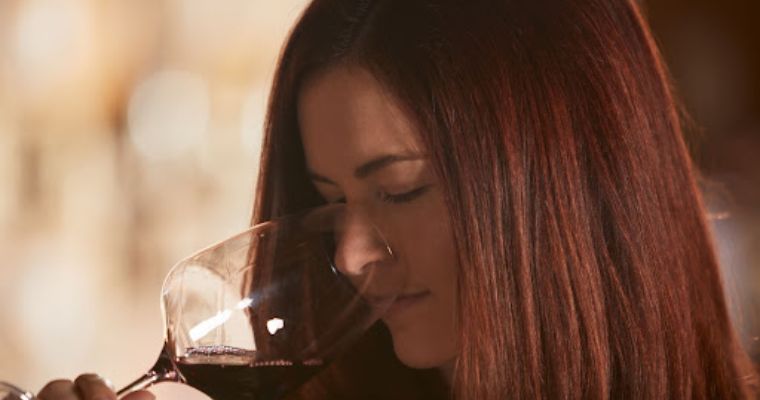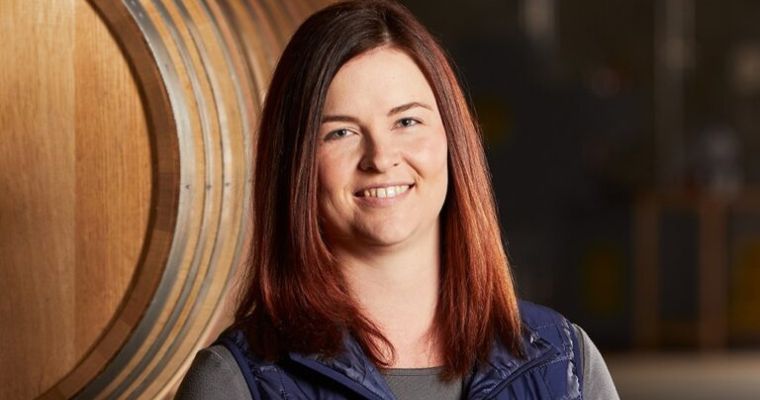Winner Announcement
June 10, 2025
Judging Date
May 18, 2026
Registration Opens
August 1, 2025

Olivia Wright studied Viticulture & Enology at UC Davis and after graduating, she got her first harvest internship in the cellar at Mumm Napa. In later years, Olivia joined Rodney Strong Wine Estates in Sonoma County. She is in charge of both the artistic and practical aspects of making wine.
Learn more about her winemaking journey in the wine space below.
I started studying Viticulture & Enology at UC Davis as a starry-eyed kid well before I was even legal to drink wine. You could call it a stroke of luck. I was not raised around the wine industry and didn't know exactly what I was getting myself into. However, being surrounded by the level of passion that everyone at Davis exudes for their craft, it didn't take long for me to fall in love with it. After graduating I did my first harvest internship in the cellar at Mumm Napa before settling down in Santa Ynez for a handful of years, gaining as much experience as I could in the cellar, lab, vineyard, and hospitality worlds. In 2018, I had another stroke of luck in getting invited to join the team at Rodney Strong Wine Estates in Sonoma County, and the rest is history, as they say.
As a winemaker at Rodney Strong, I'm responsible for both the creative and logistical aspects of our wine production. I was originally brought on to the team to manage the production laboratory, so I am still very active in the quality control processes, but my role has since expanded into something rather dynamic. Depending on the day of the week or the time of the year, you may find me in our evaluation lab tasting through blending trials, in the cellar planning workflow, in the vineyard scouting, in the tasting room connecting with our guests and industry partners, or on the road looking for the latest and greatest innovations at trade shows to help keep our winery on the cutting edge. Every day is something a little different, and it certainly never gets boring.
I think my interest in the wine industry started with my family. As a child of two airline pilots, I was fortunate to have a lot of opportunities to travel and experience different cultures when I was young. Some of my favourite trips were to wine regions (summer in Bordeaux was a big one). And one thing I always noticed was how a bottle of wine shared at the dinner table can really bring people together from any place or culture.
The ability to take calculated risks and be patient while waiting for results. Every vintage has its own unique challenges. Oftentimes you have to make decisions on the fly and sometimes you don't get to see how they play out until months or even years down the line. Being a winemaker means constantly learning to trust your own judgment under pressure, and also sometimes knowing when it's best to bring in a second opinion.
Sales and marketing are a big part of a winemaker's day-to-day responsibilities. It starts with putting ego aside and acknowledging that it is our responsibility to make wines primarily for our consumer's enjoyment. The authenticity of a marketing campaign relies largely on the winemaker to tell the story of how and why the wines are made, and then to help the sales and marketing team get that story out to those who it may resonate with.

Image: Olivia Wright
I'm sure there are a number of right answers to this one. To me though, a good winemaker is one who hones their senses, pays attention to the details, does not take shortcuts, and makes logical decisions based on his or her experience while still seeking opportunities to learn and improve. Those traits I think are important to success regardless of what type of wine you endeavor to make.
The flexibility that is demanded of a winemaker's schedule is not for the faint of heart. I have always worked with a multitude of grape varieties with a wide range of ripening windows, so it is a foregone conclusion that for 3 straight months of every year, my life is just eating, sleeping, harvest (mostly the latter). Outside of the harvest season, while there is some more leisure time to spend on friends, family, or hobbies, the day-to-day schedule could be anything from getting up at 5 am to head to the vineyards or flying across the country and staying out until midnight hosting winemaker dinners and sales events. It can be a little exhausting at times, but for those of us who are lucky to really love what we do, it's simply a way of life.
I was recently admitted as a stage 1 student in the Masters of Wine program, so presently when I'm not at work making wine I'm still mostly tasting and reading about wine! I still try to make time to enjoy local restaurants and concerts with friends and I have recently become a regular of Sonoma County's barre and yoga studios.
I think winemakers from any part of the globe are facing their own challenges with climate change, labour shortages, and rapidly changing consumer habits. As an industry that is deeply and sometimes stubbornly rooted in tradition, we're now having to pivot in big ways to maintain quality with fewer inputs, while trying to mitigate increasingly frequent extreme weather events. How we do that is under more scrutiny than ever, as sustainability has become paramount to consumer demand, and competition from other craft beverages is at an all-time high.
I’m doing more blind tasting than I have ever done before, which forces me to approach sensory evaluation from a different perspective. Mostly I just started doing this because it’s a lot of fun, but I do think it will make me a better winemaker. Much of my tasting experience previously has been focused primarily on production aspects – looking for flaws, deciding when to press off a fermentation, evaluating acid levels or oak regimes, etc. By challenging myself to taste wines from around the world broadly and without bias, I am forced to evaluate them in a totally different way, gaining a much more thorough understanding of quality and typicity.

Image: Olivia Wright
A good life is one that balances the comforts of home with the curiosity to explore and experience new perspectives. It also ideally is full of good wine, good music, and good people.
Bobby Stuckey - My attention was brought to Bobby because my family lives in Boulder. I admire how he has emphasized service as a craft and used it to cultivate the enjoyment of somewhat obscure but excellent wines in a community that is otherwise pretty fiercely dedicated to team beer.
Eric Railsback - In my early career days, I became acquainted with Eric while working at Presqu'ile Winery in Santa Maria. While Santa Maria has recently grown to international acclaim as a growing region, I would say at the time the local community was still more than a little hesitant about it all. I think Eric did some great work in opening people's eyes to the serious potential of Pinot noir and Chardonnay on California's Central Coast. His occasional sharing from his collection of Grand Cru Burgundy didn't hurt my opinion of him either, of course.
Will Moriarity - I'd be remiss if I didn't list Will as a personal friend and mentor. He has his hands in various consulting and import endeavors as well as running a private events business out of D.C. called Somm Solutions. I met Will during harvest 2020 when he, like many sommeliers from around the country, made the best of the COVID closures and came to Sonoma County to learn firsthand about what goes into the wine they are selling. I don't think I had ever met someone quite so hungry for knowledge or so enthusiastic about sharing it. I probably gained more insight on Sonoma County wines in a few tasting sessions with him than I had in the 2 years prior that I had lived here.
[[relatedPurchasesItems-41]]
- How to Love Wine by Eric Asimov, for its refreshing perspective on why we do what we do every day
- Terroir and Other Myths of Winegrowing by Dr. Mark Matthews, for the reminder to stay curious and never assume we know everything
- Wine Folly by Madeline Puckette and Justin Hammack, for its genius in delivering simple and coherent information that I still reference constantly.
Header Image: Olivia Wright; Source: Rodney Strong Vineyards
Enter your Wines now and get in front of top Sommeliers, Wine Directors, and On-Premise Wine Buyers of USA.
